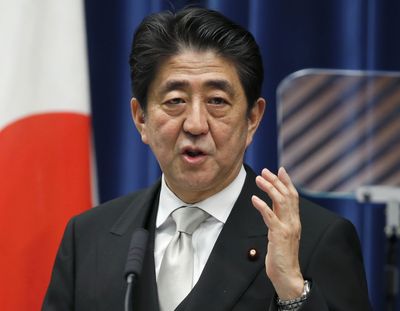New economic stimulus OK’d in Japan

TOKYO – Japan’s Cabinet approved $29 billion in fresh stimulus Saturday for the ailing economy, pledging to get growth back on track and restore the country’s precarious public finances.
Prime Minister Shinzo Abe is wrapping up his second year in office hard-pressed to salvage a recovery that fizzled into recession after a sales tax hike in April.
The stimulus plan endorsed by the Cabinet includes $5 billion earmarked for stagnant regional economies. It also lays out Abe’s vision for countering longer-term trends such as Japan’s surging public debt and a declining and aging population.
“A strong economy is the wellspring of Japan’s national strength,” said a summary of the plan released by the government.
It pledged to restore vitality to local regions to enable young Japanese “to have dreams and hopes for the future.”
But the document also acknowledged the narrow policy options open to Japan’s leaders given the country’s massive public debt, which is twice the size of the economy.
The government is sticking to its pledge to balance its budget by 2020, despite a recent decision by Abe to defer a tax hike due for next year until April 2017.
Abe has sought to spur growth and end a long spell of deflation through aggressive monetary easing and increased public spending. He also promised to undertake bold steps to break through the “bedrock” of Japan’s vested interests and bureaucracy, but has made little headway in areas such as labor and farm sector reforms.
After taking office for a third term following a snap election earlier this month, the prime minister faces growing pressure to show that his “Abenomics” strategy for nurturing growth through inflation can succeed.
The Democratic Party of Japan, the leading opposition party, issued a statement Saturday expressing its disappointment with the stimulus plan, which it said relied on old pork barrel tactics that have failed in the past.
It said DPJ lawmakers would push for policies “investing in people” to help improve incomes and boost growth.
Japan’s central bank is buying up to $660 billion in assets each month, mostly government bonds, to help spur inflation, but so far has not attained its target of 2 percent price increases overall.
Data released Friday showed inflation eased slightly in November as incomes and household spending dropped.
Since wage increases have not kept pace with inflation, rising share prices and corporate profits have done little to stimulate consumer demand, apart from a rush of purchasing ahead of the April tax hike.
The stimulus endorsed Saturday is to be paid for out of previously unused budget allocations. Instead of the “trickle down” approach of many earlier policies, some support planned for local governments will be handouts to be used as shopping vouchers to entice people to spend more.
Overall, $10 billion will go to consumers and businesses and $14.1 billion is allocated for disaster prevention and reconstruction of stricken areas, such as the northeastern coast, which is still recovering from the devastation of the March 2011 earthquake, tsunami and nuclear disaster.
The plan is packed full of goodies, such as help for rice farmers due to price declines and relief for truckers and fishermen from high fuel costs. But it also includes items addressing social ills, such as measures against suicide and child abuse.